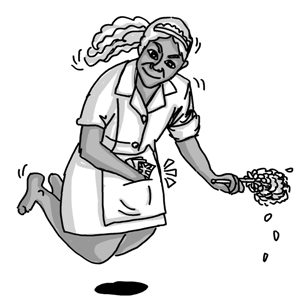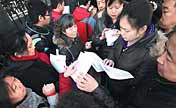
 |
| (GT/Lu Ting) |
Key Words: feiyong, ayi, Filipino maids, maids
Related:
>> 30 years history of maids in China
>> Locals hire ayis for newborns with much money
If you type in the Chinese term feiyong, Filipino maids, in a search engine, you will see a seemingly endless list of agency contacts and advertisements that promise to provide domestic services by Filipina maids. Although Chinese law bans individuals from hiring overseas maids, they are still in big demand in China.
However, problems are not uncommon in this unregulated market. The local authorities have to open the housekeeping market to the foreign workforce, and make regulations to protect the rights of employers and maids alike.
The Shanghai Morning Post reported earlier this month that a resident complained to the newspaper that an agency cheated its clients. The resident, surnamed Gao, decided to hire a Filipina after hearing that Filipina maids are not only better trained than local ayi, but can provide an English-speaking environment for her child.
She found an agency online which promised that it will introduce a maximum of four new Filipina maids within a year to a client if the client is unsatisfied with the maids' work.
However, after Gao paid the introduction fee of about 7,000 yuan ($1,126), the four maids came and left in a month. They either claimed that they were sick or were not good at tending Gao's child. The agency refused to refund the money or introduce any more Filipina maids to her since Gao had used up her quota.
This is a typical case of how an employer's rights can be violated when he or she has a problem with a foreign housekeeper. Although Gao suspected the agency of scamming customers, she did not have other options to protect herself except by exposing the problem to the media.
Since the Chinese law states that a company or a resident can be fined 50,000 yuan maximum for illegally hiring a foreigner and will be paying for the fee of repatriating the foreigner, employers in China usually have to swallow the pain instead of taking the case to the police when something bad happens, such as theft and scamming.
I think local authorities cannot simply ignore this problem. According to an agency's website, a Filipina maid is paid 5,000 to 10,000 yuan a month, double the price of local ayi. As more and more local households are better off and can afford Filipina maids, more and more families could fall victim to this unsupervised market.
Dong Baohua, a labor lawyer in Shanghai, told the Global Times that the government is actually protecting the local labor force by banning foreign ayi, but to me it is a clumsy way of protection.
Wealthy families have already found ways to get around the regulations by hiring foreign ayi who hold a tourist or foreign teacher visa, or by registering a Filipina maid as an employee for a multinational company but who actually works for the company manager's family.
If the government cannot protect local housekeepers from competition, it is better to open the market earlier and let local ayi learn from their Filipina peers.
















 Spring Style: Temperatures rise in south China cities
Spring Style: Temperatures rise in south China cities


![]()
